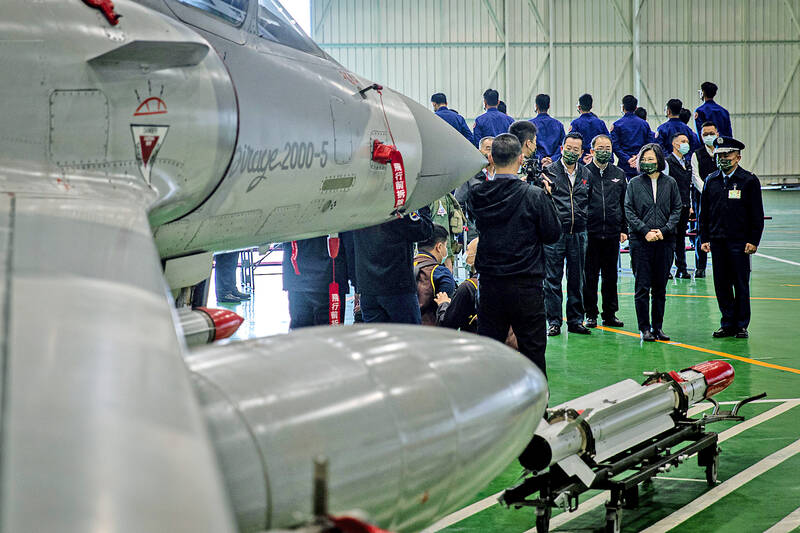Taiwan does not seek to escalate tensions or provoke conflict with China, but will resolutely defend its national sovereignty, President Tsai Ing-wen (蔡英文) said yesterday on a visit to troops in Hsinchu.
Tsai made the comment after observing an exercise by a battalion of the 542nd Armored Brigade at the army’s Northern Joint Testing Center, which she visited as part of a tour of northern military bases ahead of the Lunar New Year.
Tsai also toured the Second Tactical Fighter Wing and the Hsinchu branch of Taoyuan Armed Forces General Hospital.

Photo: Ritchie B. Tongo, EPA-EFE
The military thoroughly monitors and calmly responds to Chinese military activity in the waters and airspace surrounding the nation, while continuing to train and prepare for its defense, she said.
The government’s position is to not escalate or provoke conflict with China, while resolutely defending the nation’s sovereignty and security, she said.
Responsibility for maintaining regional peace and stability falls on both sides of the Taiwan Strait, she added.
The battalion-level tactical gunnery exercise utilized the army’s new laser-based engagement simulation system, which has significantly increased the effectiveness of unit training and wargaming, she said.
The military is updating training methods and equipment to match current military preparedness requirements, she said, adding that the reforms would be applied to the training of conscripts after mandatory military service is restored to one year.
The Ministry of National Defense is increasing the facilities, capacity and quality of military training to boost the effectiveness of the armed forces, she said.
Separately, the defense ministry has filed a request for the Executive Yuan to activate a secondary reserve fund of NT$917.34 million (US$30.19 million) to pay for soaring fuel and maintenance costs due to frequent deployments of Taiwanese ships and warplanes in response to Beijing’s military drills.
Continual probing of Taiwan’s sea and air defenses by the Chinese People’s Liberation Army (PLA) has strained military resources, especially ship and airplane fuel, a defense official familiar with the matter said yesterday on condition of anonymity.
The navy responds to suspicious movements of Chinese warships by approaching with an equal number of ships, a policy that puts the entire fleet on constant alert, the person said.
Beijing has sent warplanes into Taiwan’s air defense identification zone nearly every day for the past year, and the PLA Air Force has become more brazen in approaching or crossing the median line of the Taiwan Strait, the source said.
Chinese jets additionally conducted menacing flights from the north using air lanes Taiwan reserves for special purposes, the person added.
As the air force scrambles fighter jets to repel or intercept the Chinese aircraft, the number of flight hours have surged, resulting in pilot exhaustion and accelerated wear on the planes, they said.
These factors have led to skyrocketing fuel expenditures that exceeded the army’s fuel budget, while price hikes by energy exporters has worsened the situation, the source said.

AIR SUPPORT: The Ministry of National Defense thanked the US for the delivery, adding that it was an indicator of the White House’s commitment to the Taiwan Relations Act Deputy Minister of National Defense Po Horng-huei (柏鴻輝) and Representative to the US Alexander Yui on Friday attended a delivery ceremony for the first of Taiwan’s long-awaited 66 F-16C/D Block 70 jets at a Lockheed Martin Corp factory in Greenville, South Carolina. “We are so proud to be the global home of the F-16 and to support Taiwan’s air defense capabilities,” US Representative William Timmons wrote on X, alongside a photograph of Taiwanese and US officials at the event. The F-16C/D Block 70 jets Taiwan ordered have the same capabilities as aircraft that had been upgraded to F-16Vs. The batch of Lockheed Martin

GRIDLOCK: The National Fire Agency’s Special Search and Rescue team is on standby to travel to the countries to help out with the rescue effort A powerful earthquake rocked Myanmar and neighboring Thailand yesterday, killing at least three people in Bangkok and burying dozens when a high-rise building under construction collapsed. Footage shared on social media from Myanmar’s second-largest city showed widespread destruction, raising fears that many were trapped under the rubble or killed. The magnitude 7.7 earthquake, with an epicenter near Mandalay in Myanmar, struck at midday and was followed by a strong magnitude 6.4 aftershock. The extent of death, injury and destruction — especially in Myanmar, which is embroiled in a civil war and where information is tightly controlled at the best of times —

Taiwan was ranked the fourth-safest country in the world with a score of 82.9, trailing only Andorra, the United Arab Emirates and Qatar in Numbeo’s Safety Index by Country report. Taiwan’s score improved by 0.1 points compared with last year’s mid-year report, which had Taiwan fourth with a score of 82.8. However, both scores were lower than in last year’s first review, when Taiwan scored 83.3, and are a long way from when Taiwan was named the second-safest country in the world in 2021, scoring 84.8. Taiwan ranked higher than Singapore in ninth with a score of 77.4 and Japan in 10th with

SECURITY RISK: If there is a conflict between China and Taiwan, ‘there would likely be significant consequences to global economic and security interests,’ it said China remains the top military and cyber threat to the US and continues to make progress on capabilities to seize Taiwan, a report by US intelligence agencies said on Tuesday. The report provides an overview of the “collective insights” of top US intelligence agencies about the security threats to the US posed by foreign nations and criminal organizations. In its Annual Threat Assessment, the agencies divided threats facing the US into two broad categories, “nonstate transnational criminals and terrorists” and “major state actors,” with China, Russia, Iran and North Korea named. Of those countries, “China presents the most comprehensive and robust military threat